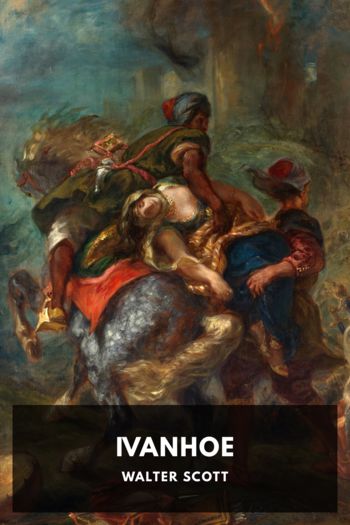Ivanhoe - Walter Scott (bookreader txt) 📗

- Author: Walter Scott
Book online «Ivanhoe - Walter Scott (bookreader txt) 📗». Author Walter Scott
And here we cannot but think it necessary to offer some better proof than the incidents of an idle tale, to vindicate the melancholy representation of manners which has been just laid before the reader. It is grievous to think that those valiant barons, to whose stand against the crown the liberties of England were indebted for their existence, should themselves have been such dreadful oppressors, and capable of excesses contrary not only to the laws of England, but to those of nature and humanity. But, alas! we have only to extract from the industrious Henry one of those numerous passages which he has collected from contemporary historians, to prove that fiction itself can hardly reach the dark reality of the horrors of the period.
The description given by the author of the Saxon Chronicle of the cruelties exercised in the reign of King Stephen by the great barons and lords of castles, who were all Normans, affords a strong proof of the excesses of which they were capable when their passions were inflamed. “They grievously oppressed the poor people by building castles; and when they were built, they filled them with wicked men, or rather devils, who seized both men and women who they imagined had any money, threw them into prison, and put them to more cruel tortures than the martyrs ever endured. They suffocated some in mud, and suspended others by the feet, or the head, or the thumbs, kindling fires below them. They squeezed the heads of some with knotted cords till they pierced their brains, while they threw others into dungeons swarming with serpents, snakes, and toads.” But it would be cruel to put the reader to the pain of perusing the remainder of this description.28
As another instance of these bitter fruits of conquest, and perhaps the strongest that can be quoted, we may mention, that the Princess Matilda, though a daughter of the King of Scotland, and afterwards both Queen of England, niece to Edgar Atheling, and mother to the Empress of Germany, the daughter, the wife, and the mother of monarchs, was obliged, during her early residence for education in England, to assume the veil of a nun, as the only means of escaping the licentious pursuit of the Norman nobles. This excuse she stated before a great council of the clergy of England, as the sole reason for her having taken the religious habit. The assembled clergy admitted the validity of the plea, and the notoriety of the circumstances upon which it was founded; giving thus an indubitable and most remarkable testimony to the existence of that disgraceful license by which that age was stained. It was a matter of public knowledge, they said, that after the conquest of King William, his Norman followers, elated by so great a victory, acknowledged no law but their own wicked pleasure, and not only despoiled the conquered Saxons of their lands and their goods, but invaded the honour of their wives and of their daughters with the most unbridled license; and hence it was then common for matrons and maidens of noble families to assume the veil, and take shelter in convents, not as called thither by the vocation of God, but solely to preserve their honour from the unbridled wickedness of man.
Such and so licentious were the times, as announced by the public declaration of the assembled clergy, recorded by Eadmer; and we need add nothing more to vindicate the probability of the scenes which we have detailed, and are about to detail, upon the more apocryphal authority of the Wardour MS.
XXIVI’ll woo her as the lion woos his bride.
DouglasWhile the scenes we have described were passing in other parts of the castle, the Jewess Rebecca awaited her fate in a distant and sequestered turret. Hither she had been led by two of her disguised ravishers, and on being thrust into the little cell, she found herself in the presence of an old sibyl, who kept murmuring to herself a Saxon rhyme, as if to beat time to the revolving dance which her spindle was performing upon the floor. The hag raised her head as Rebecca entered, and scowled at the fair Jewess with the malignant envy with which old age and ugliness, when united with evil conditions, are apt to look upon youth and beauty.
“Thou must up and away, old house-cricket,” said one of the men; “our noble master commands it—Thou must e’en leave this chamber to a fairer guest.”
“Ay,” grumbled the hag, “even thus is service requited. I have known when my bare word would have cast the best man-at-arms among ye out of saddle and out of service; and now must I up and away at the command of every groom such as thou.”
“Good Dame Urfried,” said the other man, “stand not to reason on it, but up and away. Lords’ hests must be listened to with a quick ear. Thou hast had thy day, old dame, but thy sun has long been set. Thou art now the very emblem of an old warhorse turned out on the barren heath—thou hast had thy paces in thy time, but now a broken amble is the best of them—Come, amble off with thee.”
“Ill omens dog ye both!” said the old woman; “and a kennel be your burying-place! May the evil demon Zernebock tear me limb from limb, if I leave my own cell ere I have spun out the hemp on





Comments (0)